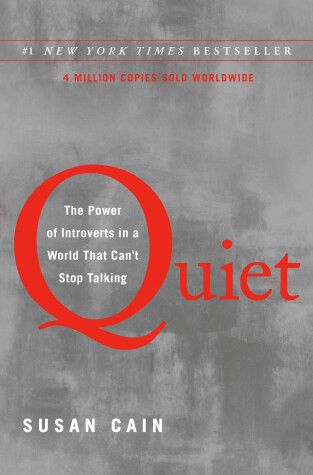Reviewed by Briana @ Pages Unbound on
Review: Quiet features a wealth of interesting facts and observations about introversion but presents them to the wrong audience. Cain focuses on and directly addresses introverts who have low self-esteem, often due to lifetime experiences of being told there is something innately wrong with them and their desire for quiet—the type of person who, like Tom on pg. 134, exults that now that he finally understands his own introversion, “I don’t need to feel apologetic or defensive in any way.” Cain clearly knows a lot of this type of introvert, enough to fill her book with examples of them and their worries. She fails to recognize, however, that there are introverts who are already happy with themselves, and her book does not address them. She also fails, until the final section, to take much advantage of the good her book can do by explaining introverts to extroverts. With such a limited audience, the book often takes on a tone of affirmation, which can seem odd or even condescending to those who do not need it.
Cain’s writing in general is not particularly engaging or lively, and the content of her book must be what hold her readers’ attention. The organization is often choppy, as the discussion flits from anecdotes to scientific studies to profiles of introverted historical figures. The short sections, usually lasting only a page or two, can help readers feel as they are moving quickly through the book—but they can also break concentration and contribute to the feeling Cain does not have too much of an attention span herself. The inability of any single topic to feature in more than two consecutive pages also builds the impression the discussion is superficial, even if it is not. Cain often returns to discuss a topic further several pages later.
And the subjects Cain introduces are fascinating. She explores the rise of the extroverted ideal in Western culture, summarizes scientific studies that have looked for the roots of introversion in our bodies, and suggests ways introverts can cope with living in an extroverted world. Theoretically, her goal is reaffirming the values of introversion—which can include having deep conversations, being more observant, the ability to concentrate for longer periods of time, and more. However, she spends a decent number of pages discussing how introverts can improve at pretending to be extroverts, without spending too much time answering a question she raises herself—whether they should.
The conclusion, however, may be the most interesting—or at least most practically useful section—as it addresses extrovert/introvert “mixed” couples can learn to understand each other better and how extroverted parents can raise introverted children. Cain even takes on the American educational system, arguing that introversion is a learning style, similar to being a visual, aural, or tactile learner, and that forcing introverted students to work in large groups or constantly speak in front of a class is not necessarily the most beneficial route a teacher can take. As schools increase emphasis on group learning, this is a message that should be brought to the attention of more educators.
Quiet may not have a lot of new information for introverts. Most of them probably already know that too much noise can make them tired, that they can give speeches better if they prepare than if forced to take extemporaneously, that they brainstorm better alone than in public groups where they feel judged. Nonetheless, there is inevitably some value in seeing that there are scientific studies backing up the observations they are already made in their daily lives. The book will certainly be enlightening for many extroverts, particularly as evidence suggests introverts are better at understanding extroversion than extroverts are at understanding intoversion.
Still torn on whether to read Quiet? Here are a few more ideas presented in the book:
“Leadership does not only apply in social situations, but also occurs in more solitary situations such as developing new techniques in the arts, creating new philosophies, writing profound books and making scientific breakthroughs” (Janet Farrall and Leonie Kronberg qtd. 78).
“We’re so impressed by the power of online collaboration that we’ve come to overvalue all group work at the expense of solo thought. We fail to realize that participating in an online working group is a form of solitude all its own. Instead we assume that the success of online collaborations will be replicated in the face-to-face world” (89).
“At the university level, introversion predicts academic performance better than cognitive ability” (167).
Reading updates
- Started reading
- 13 June, 2013: Finished reading
- 13 June, 2013: Reviewed
